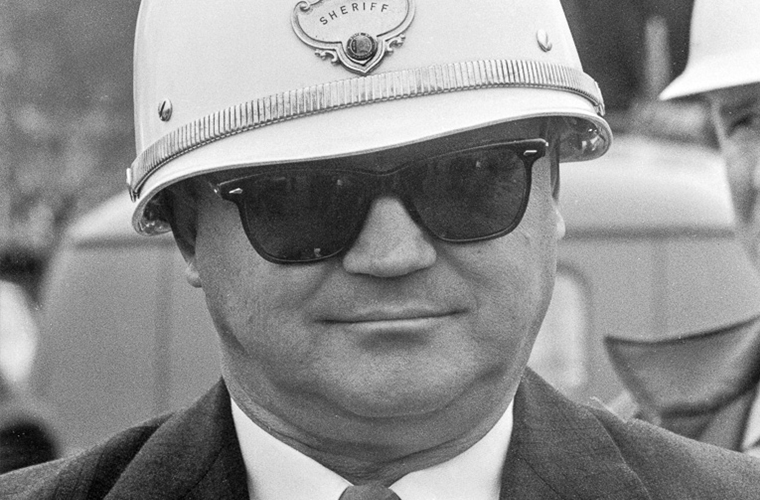In the annals of American civil rights history, few figures have left as indelible a mark as Sheriff Jim Clark. Clark, who served as the sheriff of Dallas County, Alabama, from 1955 to 1966, was a controversial and polarizing figure. His actions during the civil rights movement sparked both admiration and outrage, and his legacy continues to be a subject of debate. This article aims to provide a professional analysis of Sheriff Jim Clark’s role in the civil rights movement, examining both his actions and their impact on the larger struggle for equality.
Born in 1922 in Selma, Alabama, James G. Clark Jr. grew up in a racially segregated society. As a young man, he joined the United States Marine Corps and served during World War II. After his military service, Clark returned to Selma and eventually became involved in local politics. In 1955, he was elected sheriff of Dallas County, a position he would hold for over a decade.
Sheriff Clark’s tenure as sheriff coincided with one of the most turbulent periods in American history – the Civil Rights Movement. During this time, activists and organizers fought for racial equality, often facing violence and repression from local authorities. Sheriff Clark’s approach to these protests was characterized by a strict adherence to law and order, which sometimes involved the use of force.
One of the most infamous incidents involving Sheriff Clark occurred on March 7, 1965, during what would become known as “Bloody Sunday.” Civil rights activists, led by John Lewis and Hosea Williams, attempted to march from Selma to Montgomery to demand voting rights for African Americans. However, they were met with brutal resistance from state troopers and local law enforcement, including Sheriff Clark’s deputies. The violent clash that ensued shocked the nation and galvanized support for the civil rights movement.
Sheriff Clark’s actions during the civil rights movement had a profound impact on both local and national levels. On one hand, his staunch opposition to desegregation and his use of force against protesters garnered support from those who opposed racial integration. Many white residents of Dallas County saw him as a defender of their way of life and applauded his efforts to maintain order.
On the other hand, Sheriff Clark’s actions also drew international attention to the injustices faced by African Americans in the South. The violence witnessed during events like Bloody Sunday sparked outrage and led to increased support for civil rights legislation. In fact, just five months after Bloody Sunday, President Lyndon B. Johnson signed the Voting Rights Act of 1965 into law, a significant victory for the civil rights movement.
Sheriff Jim Clark’s legacy is a complex one. While he was undoubtedly a polarizing figure during his time as sheriff, his actions played a significant role in shaping the trajectory of the civil rights movement. His resistance to desegregation and use of force against protesters highlighted the deep-seated racism that persisted in many parts of the South.









However, Sheriff Clark’s actions also served as a catalyst for change. The violence witnessed during events like Bloody Sunday brought national attention to the struggle for racial equality and ultimately led to legislative victories for the civil rights movement.
Sheriff Jim Clark’s role in the civil rights movement cannot be understated. His actions as sheriff of Dallas County during this tumultuous time left an indelible mark on American history. While his approach to maintaining law and order was controversial and often brutal, it also served as a wake-up call for the nation, forcing many to confront the systemic racism that plagued society.
Today, Sheriff Jim Clark’s legacy serves as a reminder of both the progress made in the fight for civil rights and the work that still remains. It is through an honest examination of figures like Sheriff Clark that we can continue to learn from our past and strive for a more just and equal future.

